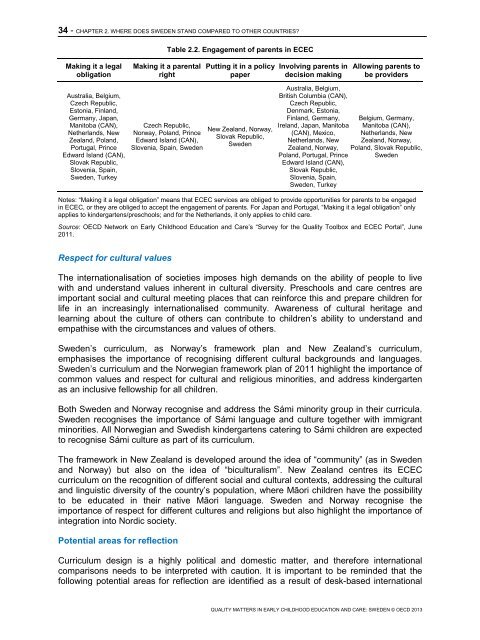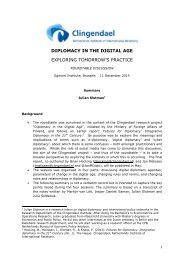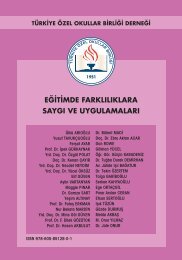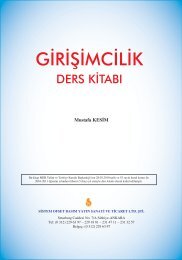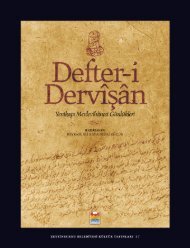SWEDEN%20policy%20profile%20-%20published%2005-02-2013
SWEDEN%20policy%20profile%20-%20published%2005-02-2013
SWEDEN%20policy%20profile%20-%20published%2005-02-2013
Create successful ePaper yourself
Turn your PDF publications into a flip-book with our unique Google optimized e-Paper software.
34 - CHAPTER 2. WHERE DOES SWEDEN STAND COMPARED TO OTHER COUNTRIES?<br />
Making it a legal<br />
obligation<br />
Australia, Belgium,<br />
Czech Republic,<br />
Estonia, Finland,<br />
Germany, Japan,<br />
Manitoba (CAN),<br />
Netherlands, New<br />
Zealand, Poland,<br />
Portugal, Prince<br />
Edward Island (CAN),<br />
Slovak Republic,<br />
Slovenia, Spain,<br />
Sweden, Turkey<br />
Table 2.2. Engagement of parents in ECEC<br />
Making it a parental<br />
right<br />
Czech Republic,<br />
Norway, Poland, Prince<br />
Edward Island (CAN),<br />
Slovenia, Spain, Sweden<br />
Putting it in a policy<br />
paper<br />
New Zealand, Norway,<br />
Slovak Republic,<br />
Sweden<br />
Involving parents in<br />
decision making<br />
Australia, Belgium,<br />
British Columbia (CAN),<br />
Czech Republic,<br />
Denmark, Estonia,<br />
Finland, Germany,<br />
Ireland, Japan, Manitoba<br />
(CAN), Mexico,<br />
Netherlands, New<br />
Zealand, Norway,<br />
Poland, Portugal, Prince<br />
Edward Island (CAN),<br />
Slovak Republic,<br />
Slovenia, Spain,<br />
Sweden, Turkey<br />
Allowing parents to<br />
be providers<br />
Belgium, Germany,<br />
Manitoba (CAN),<br />
Netherlands, New<br />
Zealand, Norway,<br />
Poland, Slovak Republic,<br />
Sweden<br />
Notes: “Making it a legal obligation” means that ECEC services are obliged to provide opportunities for parents to be engaged<br />
in ECEC, or they are obliged to accept the engagement of parents. For Japan and Portugal, “Making it a legal obligation” only<br />
applies to kindergartens/preschools; and for the Netherlands, it only applies to child care.<br />
Source: OECD Network on Early Childhood Education and Care’s “Survey for the Quality Toolbox and ECEC Portal”, June<br />
2011.<br />
Respect for cultural values<br />
The internationalisation of societies imposes high demands on the ability of people to live<br />
with and understand values inherent in cultural diversity. Preschools and care centres are<br />
important social and cultural meeting places that can reinforce this and prepare children for<br />
life in an increasingly internationalised community. Awareness of cultural heritage and<br />
learning about the culture of others can contribute to children’s ability to understand and<br />
empathise with the circumstances and values of others.<br />
Sweden’s curriculum, as Norway’s framework plan and New Zealand’s curriculum,<br />
emphasises the importance of recognising different cultural backgrounds and languages.<br />
Sweden’s curriculum and the Norwegian framework plan of 2011 highlight the importance of<br />
common values and respect for cultural and religious minorities, and address kindergarten<br />
as an inclusive fellowship for all children.<br />
Both Sweden and Norway recognise and address the Sámi minority group in their curricula.<br />
Sweden recognises the importance of Sámi language and culture together with immigrant<br />
minorities. All Norwegian and Swedish kindergartens catering to Sámi children are expected<br />
to recognise Sámi culture as part of its curriculum.<br />
The framework in New Zealand is developed around the idea of “community” (as in Sweden<br />
and Norway) but also on the idea of “biculturalism”. New Zealand centres its ECEC<br />
curriculum on the recognition of different social and cultural contexts, addressing the cultural<br />
and linguistic diversity of the country’s population, where Māori children have the possibility<br />
to be educated in their native Māori language. Sweden and Norway recognise the<br />
importance of respect for different cultures and religions but also highlight the importance of<br />
integration into Nordic society.<br />
Potential areas for reflection<br />
Curriculum design is a highly political and domestic matter, and therefore international<br />
comparisons needs to be interpreted with caution. It is important to be reminded that the<br />
following potential areas for reflection are identified as a result of desk-based international<br />
QUALITY MATTERS IN EARLY CHILDHOOD EDUCATION AND CARE: SWEDEN © OECD <strong>2013</strong>


